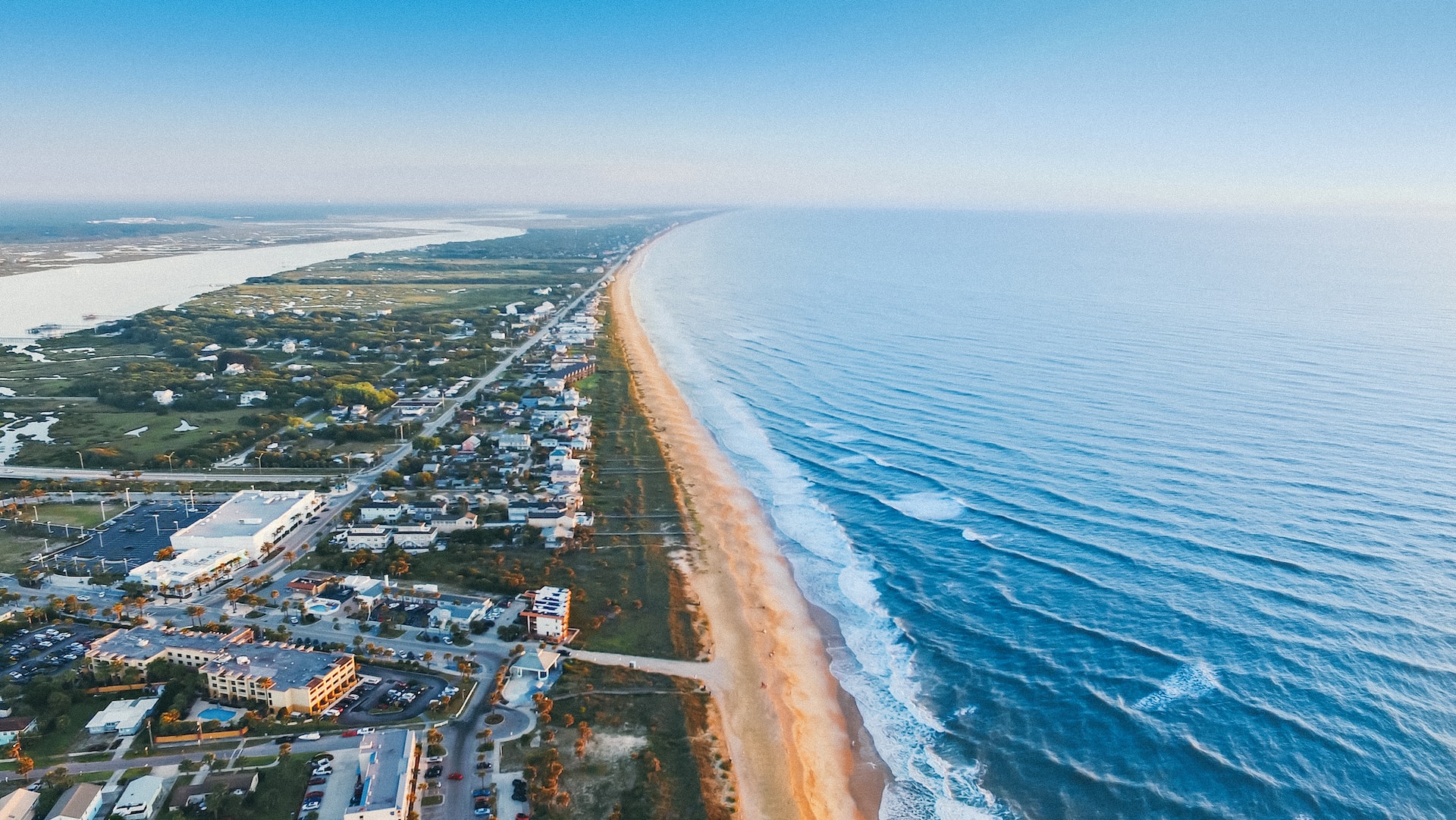Buying a House in Florida For The First Time: A Guide
November 8, 2022
Many home buyers look to Florida when they want to find their dream home. The warm climate, beautiful beaches, and numerous attractions make The Sunshine State an appealing place to live, especially for retirees. Florida also has no state income tax and an average cost of living. From 2020 to 2021, Florida gained 330,000 new residents and is one of the most popular states that people move to according to Move.org.
If you are thinking about buying a house in Florida for the first time, it’s important to understand the home-buying process in The Sunshine State. Here is everything you need to know about how to buy a Florida home.
The Process of Buying a House in Florida

Step 1: Review Your Financial Situation
First-time Florida home buyers usually don’t have a complete understanding of the costs that are associated with buying a house. There are known costs associated with owning a home including the down payment, monthly mortgage payments, and Florida property taxes. Some lesser-known fees that are often overlooked include homeowners insurance, private mortgage insurance (PMI), HOA fees, and closing costs.
Saving For The Down Payment
Many first-time home buyers are familiar with the 20 percent down payment rule of thumb. There are benefits to putting down 20 percent on a house but it is not required in most cases. In fact, the NAR reported that most first-time buyers have put down 7 percent on their home since 2018.
One of the benefits of putting 20 percent down on a house is that you won’t be required to make monthly payments for private mortgage insurance (PMI). You will also get lower interest rates on mortgages with a 20 percent down payment.
If you can’t make a 20 percent down payment comfortably, there are many options for those who need a lower down payment. Conventional loans are the most common type of mortgage for home buyers and the minimum down payment is usually 3 – 5 percent. Government-backed loans like FHA, VA, or USDA loans can have even lower minimum down payments with some requiring no down payment at all.
Homeowners Insurance
Homeowners insurance in Florida has been in a complicated state due to the threat of natural disasters and is only going to get more complicated with Hurricane Ian hitting in September 2022.
Property insurance rates are already three times the national average and Florida residents have reported that their premiums have only been increasing every year. Since 2020, a dozen insurance companies were forced to leave Florida due to the high number of claims and the expensive payouts.
Standard homeowners insurance policies cover damage from fire, severe weather, theft, and other disasters but do not cover flooding. Although 90 percent of American catastrophes involve flooding, only 4 percent of homeowners nationwide have insurance to cover it.
In Florida, the percentage of homeowners with flood insurance is 18 percent. Flood insurance is only required if you are in a high-risk flooding area but it is still recommended even if you are not in a high-risk area.
Read More: Types of Homeowners Insurance Coverage
Closing Costs
Closing costs are the final fees that come up when buying a house. During the closing process, mortgage lenders charge processing fees for creating the loan. The closing costs changes depending on if you are the buyer or seller.
The seller can also negotiate to cover some of the buyer’s closing costs as a way to sweeten the deal. Closing costs in Florida typically add up to 1 – 3 percent of the home’s purchase price. Typical closing costs for buyers include:
Lender’s Title Insurance: Protects the lender from any problems with the title. A one-time payment.
Attorney Fees: Pays for the real estate attorney that is sometimes required to be present at closing, not in Florida.
Pest Inspection Fees: In Florida, you are required to get a pest inspection as long as you are getting a loan.
Transfer Tax: Fees that go to the local government to transfer the home’s title to you.
Loan Origination Fee: Pays the lender for underwriting and processing of your loan.
Step 2: Getting Mortgage Pre-approval
Getting pre-approved for a mortgage is when a lender determines if you are eligible for a mortgage loan up to a certain amount by checking your credit score, employment history, and income. Pre-approval is not a guarantee that you will receive a mortgage from that lender but it can be a great way to give yourself more leverage when looking for a house.
Being pre-approved shows home sellers that you are a buyer that is serious and able to likely receive financing for the property. If you are going against another buyer that is not pre-approved, the seller is more likely to accept your offer.
Step 3: Deciding Where You Want To Live in Florida
Where you decide to live in Florida is extremely important. Not only will it factor into the lifestyle that you will live but it also can affect the property value, cost of living, schools in the area, and as Hurricane Ian recently demonstrated, the risk of natural disasters.
Do you want to live in northern, central, or south Florida? Florida is known for its sub-tropical climate but the closer you get to the south, the more tropical it will get. The northern and central parts of Florida are considered humid sub-tropical while the southern region is considered a tropical Savannah.
Do you want to live along the coast or in a more inland area? Living in a coastal area has amazing views and close proximity to the beach but the prices for homes are going to be significantly higher, sometimes up to 50 percent more. Coastal areas in Florida are also more susceptible to hurricanes and flooding.
Do you want to live in a big city or a smaller town? Florida has several large metropolitan areas including Miami, Tampa, Orlando, and Jacksonville. These cities have more job opportunities, better public transportation, and more nightlife and entertainment options but they also tend to be more expensive. Smaller towns will have a more relaxed pace of life and be more affordable but there may not be as many job opportunities.
Step 4: Find a Great Florida Real Estate Agent To Work With
When making such a huge purchase like buying a house, making mistakes can be overwhelmingly detrimental to your long-term finances. The home-buying process is complicated and filled with opportunities for things to go wrong.
Having a good real estate agent by your side helps to make sure that you don’t make any costly mistakes. Real estate professionals have a comprehensive understanding of the home-buying process and the local real estate market. However, not all real estate agents are good at what they do and it can be difficult to find a reputable one.
If you want a streamlined way to find a good real estate agent, then you’ll want to work with a Negotiator. Negotiators are real estate agents that have all proven themselves to be top performers in their local real estate markets. They have closed a large volume of real estate deals and are skilled in the art of negotiation.
If you’re looking to buy a Florida home and need help from a real estate agent who knows how to navigate these markets, search for a Florida Negotiator here.
Step 5: Begin Your Home Search
Most buyers would consider house hunting to be the most fun part of the home-buying process. With the help of a real estate professional, you will be able to start exploring houses and neighborhoods that fit all of your criteria including location, size, price, and more.
Without a real estate agent, this step can take a lot of time and effort as you would need to find houses that are for sale, contact the sellers, and schedule tours.
Make sure to have a list of must-haves and nice-to-haves when you start looking at houses. This will help you to stay focused on your goals and not get caught up in the emotions of buying a house. It can be easy to fall in love with a house that is under your budget or has a great backyard but if it doesn’t have everything that you need, then it probably isn’t the right house for you.
Step 6: Make a Good Offer on the House
When you find a house that you want to make an offer on, your real estate agent will help you determine how much to offer based on recent comparable sales in the area, the condition of the property, and any other unique factors.
Making an offer is one of the most important steps to buying a house. The offer represents your interest in the seller’s home and if it doesn’t catch their attention, then it’s likely that they will move on to the next buyer. Your real estate agent will be able to help you make a strong offer that stands out from the other buyers while also being fair to the seller.
Read More: How To Make a Good Offer on a House
Step 7: Appraisals and Home Inspections
After your offer is accepted, the home will need to be appraised to ensure that the price you’re paying is in line with the current market value. An appraisal is when a professional inspector does a thorough examination of the property to assess its true worth apart from the listing price. The mortgage lender usually requires an appraisal and once the appraisal is complete, you’ll be one step closer to finalizing your loan and getting the keys to your new home.
However, even though appraisals can reveal issues within the property. the purpose is not to be a home inspection. It’s important to schedule a separate home inspection with a certified inspector to get a detailed report of the property’s condition.
Buying a house that has problems like a faulty roof or electrical wiring can be a nightmare and cost you a lot of money down the road. A home inspection will give you an accurate picture of the property’s condition so that you can make an informed decision about whether or not to move forward with the purchase. Many lenders also require inspections to finalize a loan.
Read More: How To Choose a Home Inspector
Step 8: The Closing Process
Closing is the last step in the home-buying process and arguably the most crucial. It takes about 30 to 45 days to close on a home. The process requires the signatures of both the buyer and the seller on a stack of documents. This includes loan documents, purchase contracts, and more.
On Closing Day, the buyer and seller finalize all of the necessary documents, the seller hands over the keys to the house, and the buyer officially becomes the new homeowner.
Work With a Negotiator To Buy a House in Florida
Looking for a good real estate agent in Florida? Then you’ll want to work with a Negotiator. Negotiators are top real estate agents who have a proven track record of getting their clients the best possible deal on their home purchase or sale. These agents are located in Florida along with many other states across the country and have a wealth of experience in helping people move to a new house.

